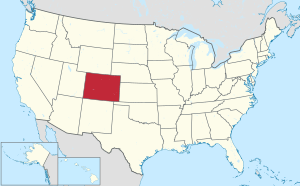Lincoln County, Colorado facts for kids
Quick facts for kids
Lincoln County
|
|
|---|---|

Lincoln County Courthouse in Hugo
|
|

Location within the U.S. state of Colorado
|
|
 Colorado's location within the U.S. |
|
| Country | |
| State | |
| Founded | April 11, 1889 |
| Named for | Abraham Lincoln |
| Seat | Hugo |
| Largest town | Limon |
| Area | |
| • Total | 2,586 sq mi (6,700 km2) |
| • Land | 2,578 sq mi (6,680 km2) |
| • Water | 8.8 sq mi (23 km2) 0.3%% |
| Population
(2020)
|
|
| • Total | 5,675 |
| • Estimate
(2023)
|
5,480 |
| • Density | 2.1945/sq mi (0.84730/km2) |
| Time zone | UTC−7 (Mountain) |
| • Summer (DST) | UTC−6 (MDT) |
| Congressional district | 4th |
Lincoln County is a county located in the U.S. state of Colorado. As of the 2020 census, the population was 5,675. The county seat is Hugo. The county obtains its name in memory of the United States President Abraham Lincoln. County was formed from portions of Bent and Elbert counties in 1889 from a restructuring of Colorado counties.
Contents
Geography
According to the U.S. Census Bureau, the county has a total area of 2,586 square miles (6,700 km2), of which 2,578 square miles (6,680 km2) is land and 8.8 square miles (23 km2) (0.3%) is water.
The main watersheds include the Arikaree and Republican Rivers in the northern part of the county and the Big Sandy, Rush, and Horse Creeks in the southern part of the county. Big Sandy and Rush Creeks ultimately drain into the Arkansas River.
Adjacent counties
- Washington County - north
- Kit Carson County - east
- Cheyenne County - east
- Crowley County - south
- Kiowa County - south
- Elbert County - west
- El Paso County - west
- Arapahoe County - northwest
- Pueblo County - southwest
Major highways
 Interstate 70
Interstate 70 I-70 Bus.
I-70 Bus. U.S. Highway 24
U.S. Highway 24 U.S. Highway 40
U.S. Highway 40 U.S. Highway 287
U.S. Highway 287 State Highway 71
State Highway 71 State Highway 94
State Highway 94
Demographics
| Historical population | |||
|---|---|---|---|
| Census | Pop. | %± | |
| 1890 | 689 | — | |
| 1900 | 926 | 34.4% | |
| 1910 | 5,917 | 539.0% | |
| 1920 | 8,273 | 39.8% | |
| 1930 | 7,850 | −5.1% | |
| 1940 | 5,882 | −25.1% | |
| 1950 | 5,909 | 0.5% | |
| 1960 | 5,310 | −10.1% | |
| 1970 | 4,836 | −8.9% | |
| 1980 | 4,663 | −3.6% | |
| 1990 | 4,529 | −2.9% | |
| 2000 | 6,087 | 34.4% | |
| 2010 | 5,467 | −10.2% | |
| 2020 | 5,675 | 3.8% | |
| 2023 (est.) | 5,480 | 0.2% | |
| U.S. Decennial Census 1790-1960 1900-1990 1990-2000 2010-2020 |
|||
At the 2000 census there were 6,087 people in 2,058 households, including 1,389 families, in the county. The population density was 2 people per square mile (0.77 people/km2). There were 2,406 housing units at an average density of 1 units per square mile (0.39 units/km2). The racial makeup of the county was 86.30% White, 4.96% Black or African American, 0.94% Native American, 0.56% Asian, 0.03% Pacific Islander, 5.65% from other races, and 1.56% from two or more races. 8.53% of the population were Hispanic or Latino of any race. Of the 2,058 households 33.70% had children under the age of 18 living with them, 55.30% were married couples living together, 8.40% had a female householder with no husband present, and 32.50% were non-families. 29.00% of households were one person and 13.00% were one person aged 65 or older. The average household size was 2.44 and the average family size was 3.04.
The age distribution was 23.90% under the age of 18, 7.10% from 18 to 24, 33.00% from 25 to 44, 21.80% from 45 to 64, and 14.30% 65 or older. The median age was 38 years. For every 100 females there were 130.90 males. For every 100 females age 18 and over, there were 140.70 males.
The median household income was $31,914 and the median family income was $39,738. Males had a median income of $25,742 versus $22,188 for females. The per capita income for the county was $15,510. About 8.10% of families and 11.70% of the population were below the poverty line, including 14.40% of those under age 18 and 11.50% of those age 65 or over.
Communities
Towns
Unincorporated communities
Historic trail
- Smoky Hill Trail
The name "Smoky Hill" comes from the appearance of the misty or smoky hills that the westward travelers viewed on their journey from Kansas and Nebraska Territories and Missouri toward the Colorado Gold Rush starting in 1858. Gold, had been discovered in the Cherry Creek, near Denver. The image of the misty hills and valleys along the route west gave the name to the trail for these travelers — the Smoky Hill Trail. Parts of the trail can still be seen as a two-track road on the Eastern Plains in what was once Kansas Territory but now is Colorado.
The section of the Smoky Hill Trail which passes through much of the High Plains has become known as the "starvation trail." This section of the trail proved to be the most difficult, due to a lack of water, yet the Plains Indians of the day considered this region as prime hunting ground.
See also
 In Spanish: Condado de Lincoln (Colorado) para niños
In Spanish: Condado de Lincoln (Colorado) para niños
 | Janet Taylor Pickett |
 | Synthia Saint James |
 | Howardena Pindell |
 | Faith Ringgold |

